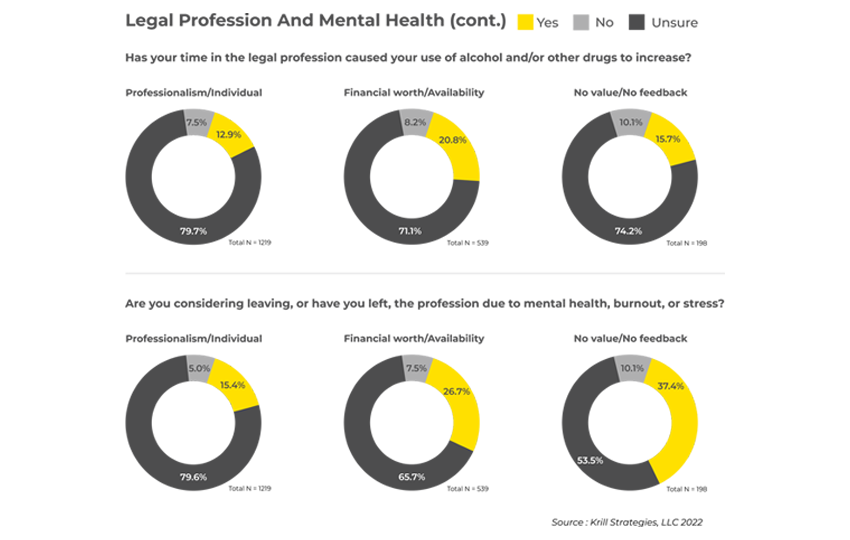In the post-pandemic landscape, the legal industry finds itself grappling with unprecedented challenges. Remote work, escalating work hours, and the relentless pursuit of billable hours have compounded the already weighty responsibilities of law firms managing administrative tasks and conducting exhaustive case-related research.
Legal Technology A Solution To Lawyer's Burnout And Labor Shortage

Amidst this demanding environment, a unique dilemma has emerged, marked by lawyer burnout stemming from mounting workloads and pressures, coupled with a perceived scarcity of legal talent. This predicament unfolds against a backdrop of profound changes in the business, legal, regulatory, and judicial ecosystems, coupled with an overarching shift towards technology across the legal landscape.
The confluence of these factors has intensified the need for legal practitioners to not only keep pace with market expectations but to surpass them in terms of efficiency.
The resistance to embracing technology in this dynamic landscape poses a significant risk to businesses. Technological solutions have the power to simplify tasks, reduce costs, and enhance client satisfaction-ultimately leading to improved productivity and efficiency. As all interconnected legal ecosystems swiftly adopt technology, its incorporation becomes imperative to address the twin challenges of lawyer burnout and labour shortage.
In this context, technology adoption emerges as a pivotal solution for the legal fraternity—both in law firms and in-house corporate legal teams . This article delves into the intricacies of the black box challenge, examining its origins, current implications, and proposes a potential solution by exploring the transformative potential of legal tech solutions.

Lawyer’s shortage- is it an organizational loss?
A closer look at the organizational impactThe post-COVID era has ushered in a myriad of challenges, and the legal industry is not immune to the labour shortage predicament faced by many other sectors. Reports and statistics from various corners of the globe, including Australia, The United States, and the United Kingdom, paint a vivid picture of the industry grappling with a shortage of legal professionals.
This shortage has triggered an upward trajectory in salary payouts as firms strive to compensate for heightened pressures, extensive work hours, and the prevalence of an "always-on" culture, where burnout has become the norm. Consequently, the legal field is witnessing a drain of talent, marking a period of unprecedented lawyer shortage.
Impact on law firm productivity
The ripple effects of this talent shortage are profound and have a direct bearing on the productivity of law firms. The intensified workloads have taken a toll on the emotional and physical well-being of lawyers, with alarming accounts emerging of young attorneys teetering on the brink of hospitalization due to stress, anxiety, and burnout. The surge in mergers and acquisitions in the United States, while bolstering companies' financial standings, has simultaneously contributed to disastrous turnover rates.
Renewal terms
Along with having a clear idea about the timeline of a contract, you may have to deal with numerous renewals. An automated tool for contract analytics integrated with CLM can send you smart alerts and indicate further actions. You can then analyze if the parties need to renew the contract manually or this can be done automatically. This saves not just the pain of keeping track of renewals but also helps with reducing the liability for missing deadlines.
Evidence from Australia and New Zealand mirrors this concerning trend, with statistics indicating that 85% of legal professionals either personally experience anxiety or are aware of a colleague facing it. Furthermore, 80% have personal experience or know someone in the field dealing with depression. This distressing reality has become a driving force behind what is now termed the "great resignation" in the legal industry-a manifestation of burnout leading to a scarcity of available lawyers for hiring. The question then arises: Is this lawyer shortage not just a talent drain but a substantial organizational loss?
Technology as the panacea for legal challenges
The widespread adoption of technology in the legal realm is still a journey in progress, with the industry making significant strides but yet to achieve universal integration.
McKinsey estimates reveal that 22% of a lawyer's work and 35% of a law clerk's tasks can be automated, indicating a substantial potential for technological intervention ("Lawyer-Bots Are Shaking Up Jobs").
However, several obstacles hinder the legal industry's embrace of technology, ranging from lawyers' traditionalism and concerns about its impact on billable hours to overarching apprehensions about its efficacy. One of the most significant barriers to the integration of advanced decision-making technology in the legal field is the black box challenge-the opacity surrounding how software arrives at its decisions. Compared to other industries, particularly in the realms of artificial intelligence (AI) and machine learning (ML), the legal sector lags significantly behind. In 2018, global investments in legal tech amounted to just $1 billion, a stark contrast to the $41 billion poured into fintech (source: KPMG Report)
Maximizing resources in times of lawyer shortage
The shortage of lawyers necessitates resource optimization for companies, ensuring that employees' time is channeled toward high-value tasks. Legal tech plays a crucial role in achieving this goal, offering solutions like contract lifecycle management, enterprise Legal Management, legal query management, legal spend management, and legal document management software. By automating key administrative duties such as e-billing, legal operations, finance management, client/matter management, and time monitoring, legal tech empowers attorneys to focus on essential tasks like client assistance and courtroom arguments.
Embracing automation for productivity
Firms can leverage automation to enhance staff productivity, allowing them to concentrate on high-value and engaging work while relieving them of low-value responsibilities. Considering the preferences and technological expectations of younger attorneys and employees, who seek advanced technology, remote access, and flexibility, becomes crucial. Failure to incorporate legal tech tools may hinder companies in attracting and retaining top talent. While technology can't entirely resolve the current labor shortage, it can maximize productivity with the existing workforce, aiding firms in winning the talent war and ensuring long-term job retention.
Emergence of legal technology
The benefits of technology in the legal industry are still in their early stages but are gradually gaining recognition. Evidence suggests slow adoption of new technology, particularly among private practice and in-house attorneys. However, some companies have taken proactive steps, establishing internal big data analysis and AI teams or launching AI-based products for efficient law firm management and streamlined end-to-end contract processes.
According to the 2019 global legal department benchmarking report, technology adoption by law firms has considerably grown, enhancing staff productivity and overall effectiveness. Legal technology has fostered transparency between law firms and clients, offering benefits in various areas, including legal research, predictive coding and e-discovery, digital billing, legal document management, contract verification, law practice management, end-to-end contract processes, and more.
In the legal sector, avoidable mistakes during contract negotiations, billing, and paperwork are prevalent. Surveys indicate that legal professionals experience severe burnout, affecting them on cerebral, physical, and emotional levels. Technology emerges as a conduit for resolving these issues, particularly through the automation of procedures and workflows.

We are transforming legal technology
We at RazorSign, adhering to Occam's Razor principle, focus on simplifying and concentrating the work for legal departments and companies. Our comprehensive suite of products includes a contracts-driven legal operations platform and a law practice management platform. These platforms integrate cutting-edge technologies, such as AI, blockchain, and e-sign platforms, to offer a unified, efficient, and transformative solution for legal business processes.
We are committed to providing better technology, superior service, and more efficient processes to position them as a leader in the legal tech landscape. We stand at the forefront of legal technology, having garnered acclaim for its effective services from numerous prestigious law firms and conglomerates. With a proven track record of satisfying over 100 domestic clients, and is poised to make its mark on the international stage. The company's singular objective is to seamlessly fuse business and law through state-of-the-art legal technology.
We promise to revolutionize law firms, streamline workflows, and enhance collaboration through innovative technology. The company's renewed appearance reflects its enduring values and a refreshed commitment to empowering its clients to work more efficiently. Connect with us to explore its services, pricing, and embark on a journey into a realm of efficient and robust technology, where the future of law meets cutting-edge innovation.Share on -


